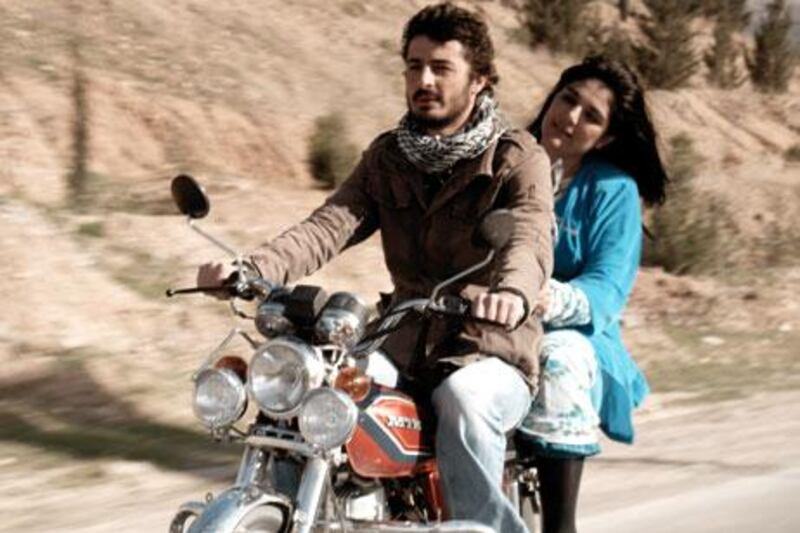The Arab Spring, gardeners wrongly convicted of murder and the lives of female boxers are just some of the stories that will be jostling for attention in the Arab Competition at this year’s Doha Tribeca Film Festival. The line-up – which was announced by the Doha Film Institute today – includes 14 different films by directors from across the region competing for five separate jury awards. There are also two audience awards, each coming with a cash prize of $100,000 (Dh367,300). And, expanding the competition since it began last year, this time the films, of which eight are world premieres, will be split between narrative and documentary. Here are the Arab films up for awards when the festival starts on October 25.
A Man of Honour (Directed by Jean-Claude Codsi)
Set in Lebanon and Jordan, A Man of Honour tells a story of passion, betrayal and the various facets of human nature. Brahim has a chance encounter with a mysterious woman he knew 20 years ago. Because of this woman, he committed murder and must now return home to face his past.
Red Heart (Halkwat Mustafa)
Shot in Kurdistan, this is the first film from 26-year-old Iraqi-born Mustafa, now a Norwegian citizen. Following the death of her mother, 19-year-old Shirin discovers that her father plans to trade her for a new wife. After escaping to the city with her secret boyfriend, Shirin faces up to the dangers and challenges of this new life.
How Big Is Your Love (Fatma Zohra Zamoum)
Algerian director Zamoum examines childhood and love in modern Algiers with this touching story about Adel, a boy sent to live with his grandparents for the weekend. Two days turn into a week, and soon Adel feels like he’s lived there forever, as his grandparents involve him in their everyday lives.
El Shooq / Lust (Khaled El Hagar)
Already considered one of Egypt's most well-known filmmakers, El Hagar took home Best Film at last year's Cairo International Film Festival with this title. EL Shooq / Lust takes us into the lives of the inhabitants of a marginalised street in Alexandria before the revolution, looking into each character's fierce, yet fragile, dreams.
Smuggler's Song (Rabah Ameur-Zaimeche)
The fourth feature from French-Algerian director Ameur-Zaimeche, Smuggler's Song tells the tale of a band of mid-18th outsiders – set after the death of their famous, real-life leader Louis Mandrin – as they roam the French countryside trying to forment revolution through chants and unlawful behaviour.
Normal (Merzak Allouache)
Algerian filmmaker Allouache is no stranger to awards, having been an Oscar-nominee for his 1996 Salut Cousin! In this feature, set after the Algerian riots of December while the Arab Spring rises up in Tunisia and Egypt, a man – Fouzi – shows the incomplete editing of a film he made two years earlier showing the disillusionment of a youth seeking to express artistic ideas.
Omar Killed Me (Roschdy Zem)
French actor-turned-director Zem dramatises the real-life 1990s trial of a Moroccan gardener wrongly accused of killing his affluent employer in the Côte d’Azur, highlighting the social injustice that saw a uneducated immigrant falsely imprisoned.
Rouge Parole (Elyes Baccar)
This documentary from the Tunisian director tries to express the view of the Tunisian people, looking at the turbulence of the recent revolution, the expulsion of Ben Ali and the country’s first moves towards democracy through the eyes of its different citizens.
The Three Disappearances of Soad Hosni (Rania Stephan)
Using footage taken from VHS tapes of her films, Lebanese director Stephan explores the story of famed Egyptian actress Hosni, once dubbed the ‘Cinderella of Egyptian Cinema’ and still considered one of the most beautiful actresses in Middle East history, right up to her tragic death in 2001.
Yearning (Lina Alabed)
Jordanian journalist and filmmaker Alabed uses her documentary to look at the actual role and margin of freedom women have in a male-dominated society, and how that reflects on their femininity and relationship with themselves.
Crayons of Askalan (Laila Hotait Salas)
The subject of Spanish-Lebanese director Salas’ documentary is Zuhdi Al Adawi, a Palestinian artist who was jailed in Israel from the age of 15 to 30. Using crayons smuggled in by friends and family, Al Adawi was able to transcend his cell walls by drawing on scraps of pillow.
The Virgin, The Copts and Me (Namir Abdel Messeeh)
One day, with his mother, French/Egyptian filmmaker Messeeh watched a videotape of the Virgin Mary’s apparition in Egypt. His mother, like millions of Copts, sees the Virgin on the screen, while he did not. This documentary sees Messeeh travel back to Egypt to find out about these apparitions.
Boxing With Her (Latifa Robbana Doghri)
This Tunisian documentary explores the world of female boxing in Arab society, looking at how the presence of a female body in the pugilistic arena is still considered awkward and sometimes even taboo.
On the Road to Downtown (Sherif El Bendary)
Egyptian director El Bendary’s entry in the documentary section looks at a downtown neighbourhood of Cairo, full of diversity, contradictions and personalities, through the daily lives of its residents.





